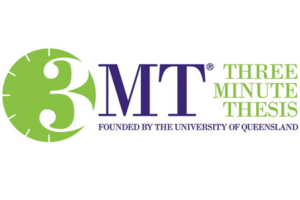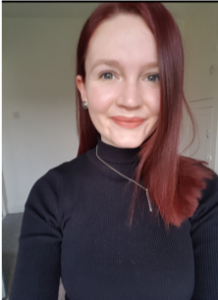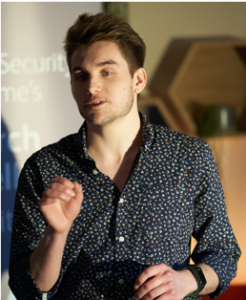Two of our DTP students – Katie West and Alex Setchfield – took part in the University of York 2020 3-Minute Thesis (3MT) competition and presented their work in the final round on Wednesday 10th June 2020. We talked to Katie and Alex about the whole process – from their motivation to take part, through the preparation they did, to their reflections on the process! We would like to say a very big ‘well done’ to Katie and Alex on making it to the final of the competition, especially with the challenges presented by the coronavirus pandemic! Read their full interview to find out more about their experience and the invaluable advice they have for anyone who wants to try taking part in 3MT in the future, as well as a link where you can watch the event in full.
Tell us a bit about yourselves and your PhD projects.
Katie joined the BBSRC White Rose DTP in 2018. Her PhD is focussed on understanding the role of long non-coding RNAs in CD4+ T cells. She is based at the University of York in the Lagos laboratory.
Like Katie, Alex also joined the BBSRC White Rose DTP in 2018. Working in the Bruce group at the University of York, in an iCASE collaboration with Fera Science Ltd, his PhD aims to develop a technology to transform agricultural crop waste into livestock feed using microbial and insect biotechnology.
What is the 3MT competition?
Several years ago a period of severe drought occurred in the state of Queensland, Australia. To reduce water consumption residents were encouraged to take shorter showers; as such it was common for residents to fix a 3-minute egg timer to the wall of their bathrooms. During this period Professor Alan Lawson from the University of Queensland was inspired and created the 3MT competition. Its success has established local and national competitions in multiple countries across the globe.
The 3MT competition challenges doctoral students to concisely explain their PhD project to a non-specialist audience in just three minutes with a single static PowerPoint slide.
Any PhD student who has passed their first year review and has not yet completed their viva is eligible to compete.
Why did you take part in 3MT?
Katie: I wanted to challenge myself to improve my public speaking skills and the 3MT competition seemed like the perfect opportunity. I also believe it is important to be able to communicate scientific research to a lay audience and it was a great chance to be able to share part of my research with family and friends.
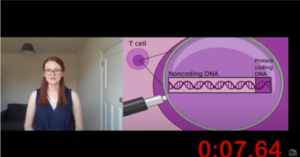
Alex: Having taken part in previous public speaking events during my PhD I saw the 3MT competition as a great opportunity to develop my science communication skills further. Like Katie, I believe it is important to communicate complex scientific research to non-specialist audiences as it provides a key link between academia and the general public, and may also help to inspire the next generation of scientists! I also see science communication as a potential future career path so I felt 3MT, a world-renowned competition, would be a strong addition to my CV. It will also make a good answer to the inevitable interview question – “so what did you do during lockdown…?”
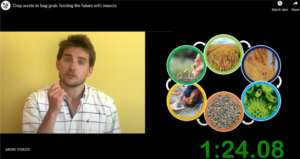
What was the process like?
The process began with an online application, in which we had to submit a proposed title and 500-word lay summary of our research. Having progressed through this initial stage, we were then invited to audition. Usually this would have been a live ‘in-person’ audition, however due to the restrictions which arose as a result of the coronavirus pandemic, this had to be held virtually for which we recorded our proposed 3MT talks. Following the auditions, Katie and Alex were thrilled to reach the 3MT final on Wednesday 10th June 2020 alongside nine others from a wide range of academic disciplines!
Prior to the final, the University of York Research Excellence Training Team (RETT) and previous 3MT winners ran several training sessions to help us to refine our talk, delivery and PowerPoint slide. As with the audition, these were unable to be held in person this year and instead were hosted via Zoom. Despite this they were still extremely helpful in preparing and developing our talks for the big day.
With coronavirus restrictions still in place, the decision was made to hold the 3MT final as a live online webinar using pre-recorded talks to minimise technical difficulties on the night. It was great to be able to submit a talk we were completely happy with, yet made it very tricky picking and recording a final video! The competition was a great success, with little to no technical difficulties and it was lovely to be able to see everyone’s final talks.
If you would like to watch the event it can be found online here .
What did you gain from taking part in the competition?
Katie: I really enjoyed taking part in the 3MT competition, I think my confidence in public speaking has improved and I found the training sessions particularly helpful. I would encourage anyone who wants to improve their speaking skills to take part in 3MT. I do however think that the process encourages participants to overstate the potential impact of their research to make their talk more interesting and exciting. But this is a common problem with science communication, as can be seen in regular newspaper headlines which state “new miracle cures” or “frightful risk to health” despite this rarely being the case.
Alex: I very much enjoyed taking part in the 3MT competition – it was a great experience. I feel that my science communication techniques developed during the process with the help of various training sessions and feedback along the way, which felt really rewarding. The process encourages you to focus on the salient points of your research and develop a single clear message. In particular I learned how to develop an engaging opening hook, tailored to the audience, in order to grab their attention from the very beginning. I would recommend taking part in 3MT to all PhD students as being able to communicate your complex research in just three minutes is a real skill, though rather challenging!
What advice would you give to prospective competitors?
- Practise, practise, practise! Do this without your script as early as possible so that your talk comes across more natural and less rehearsed (even though it will be hugely rehearsed, try to make it feel less so!) Make sure to time yourself when practising and maximise those three short minutes – you’d be surprised what you can fit in.
- Consider using an ‘hourglass’ structure. Start with the big picture, focus in on your specific research, then end on how your research will impact the bigger picture.
- Focus on communicating a single clear message. What do you want the audience to take away from your talk? Do you want them to behave differently as a result?
- Watch previous participants’ talks for inspiration. Many are available online, including previous White Rose university competitors and those from all around the world.
- Ask for feedback from family and friends, in particular those that know little about your research, and don’t be surprised if their feedback appears contradictory! This feedback will be invaluable in developing a single clear message and helps you to avoid assuming too much prior knowledge – it’s okay (and better) to keep things simple.
- Keep your PowerPoint slide clear and simple, keeping words to a minimum (if any at all). You don’t want the audience reading your slide rather than listening to your talk!
- Record yourself and watch it back with the sound off so that you can focus on your body language and physical delivery. Does it complement the points you’re making?
- Finally, enjoy it! You have three minutes to explain to the audience why your research is so interesting and exciting, as well as the potential impact it could have on society.

